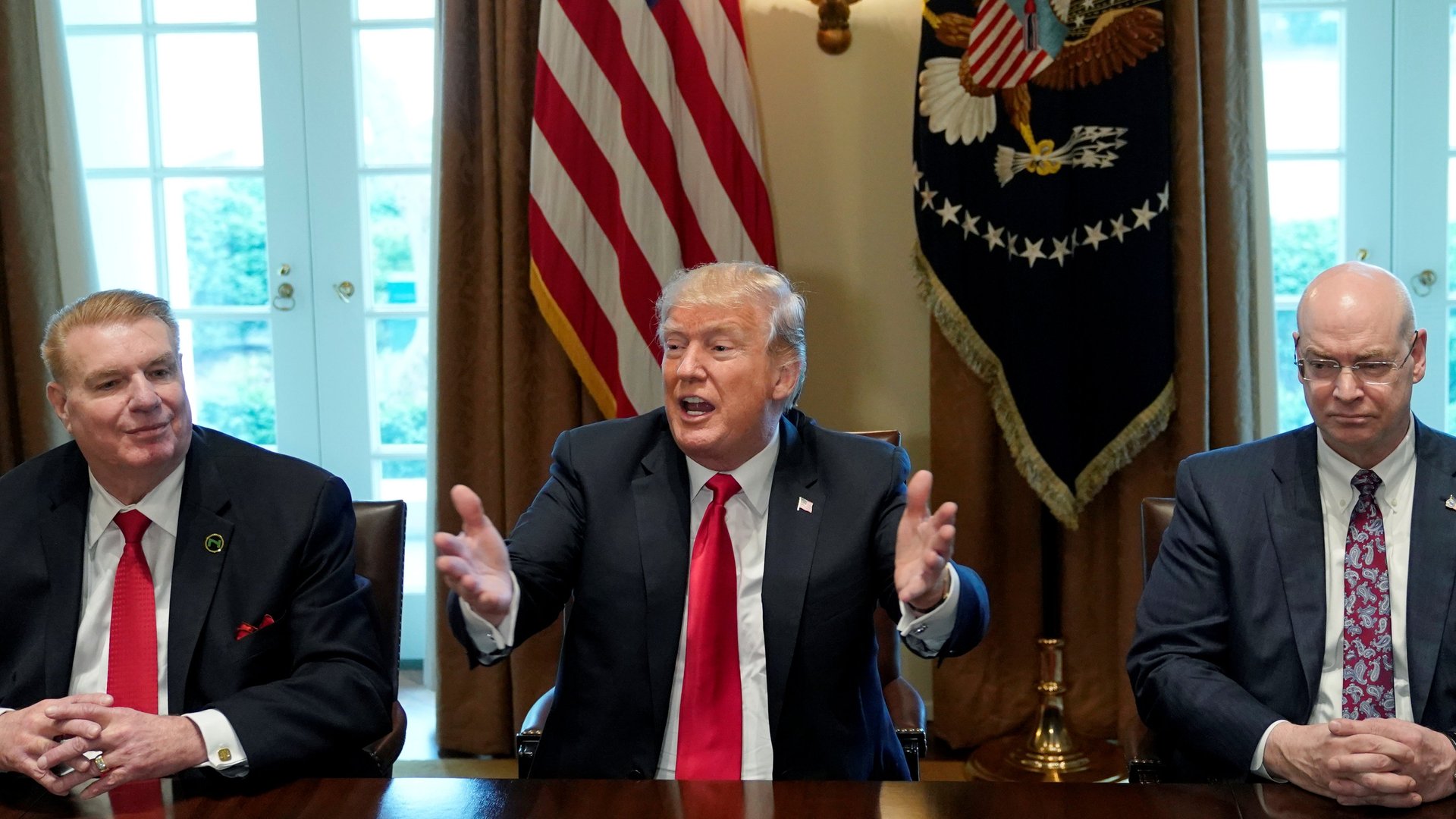Trump says his new tariffs are about national security. They’re not.
Donald Trump claims that steep new import taxes on aluminum and steel will protect US national security. Few people believe him, and that’s a problem for him—and the world.


Donald Trump claims that steep new import taxes on aluminum and steel will protect US national security. Few people believe him, and that’s a problem for him—and the world.
Trump’s zero-sum worldview has painted foreign countries as the main threat to American economic prosperity. While that’s a factually dubious position, there’s no question unfair trade practices have undermined the case for globalization: China is widely seen as unfairly subsidizing its aluminum and steel producers, giving them an advantage on the global market and undermining the production of raw metals around the world. But the US imports very little steel from China—less than 2% of its supply—because it has already put in place limits on such imports by challenging China’s subsidies at the World Trade Organization.
Nevertheless, the Trump administration promised its voters more big action on trade. Further WTO challenges could take years, so to make policy more quickly, Trump invoked section 232 of the Trade Expansion Act of 1962, which grants the US the ability to impose trade restrictions in the name of national security. Yet the administration’s approach to negotiating those trade restrictions throws its whole “national security” case out the window.
Here’s the bigger picture: The global economy such as we know it today operates under a set of trade rules—mostly, the removal of a lot of trade barriers—that created the WTO in the 1990s. (A further round of trade negotiations, focused on redressing the problems facing developing countries, began in 2001 and is still, hypothetically, ongoing.) These rules have enabled a massive reduction of global poverty and growing prosperity, and also massive economic and cultural dislocation.
The rules, as a massive global compromise, are disliked by basically everyone. Yet paying lip service to the framework has been key to globalization and the relatively peaceful coexistence of great powers in the post-Cold War age, even as the locus of trade negotiations has moved from the stagnant WTO to regional deals like the Trans-Pacific Partnership. One norm is that exceptions for national security should be actually related to national security.
The US rarely invokes national security to raise trade barriers; it hasn’t brought a successful case since the 1980s. In the case of steel and aluminum, most analysts argued that the US has access to reliable supplies from allies like Canada, South Korea and Brazil, the major foreign suppliers of US steel. Steel and aluminum smelting technology is not advanced beyond the reach of US manufacturers; indeed, US metal production has remained steady; the real threat to jobs comes from increasing productivity.
This time around, the US abandoned this standard and Commerce Secretary Wilbur Ross, a long-time investor in the steel industry, ruled that buying metal from allies was no longer sufficient. That will allow the US to impose new tariffs—which will mostly punish the country’s closest political and economic counter-parts. Indeed, more US jobs are likely to be lost (pdf) at metal-goods manufacturers than gained in producing raw metals. ”The Chinese are not really targeted by these actions at all,” Edward Alden, a former Financial Times reporter who follows trade issues closely, said.
And Trump has now linked the metal tariffs to on-going talks between the US, Mexico and Canada to re-negotiate the trade rules between the three closely linked nations. “Tariffs on Steel and Aluminum will only come off if new & fair NAFTA agreement is signed,” the president wrote this morning. Either these new tariffs protect an industry that is vital to the safety of the US, or they are a bargaining chip to be used against other economic gains—but they cannot be both.
Even suggesting that the tariffs are negotiable will undermine their rationale, Michael Froman, a former trade negotiator during the Obama administration said today, arguing that private investors are unlikely to increase funding in metal production if they believe the rules will be changed again at the drop of the hat. But Froman’s larger concern was that abusing the national security provision could undermine the entire trade framework.
This goes beyond the fear of tit-for-tat tariffs designed to punish US industries for symbolic purposes, as the EU has said it will deploy if Trump enacts the new tariffs, or even the $14.2 billion in retaliation that the WTO could authorize if it rules that the US is abusing trade rules.
One constant complaint about the world trade rules is that they privilege American agricultural producers, who benefit from US subsidies and enormous productivity gains from technology compared to farmers in developing nations. There is little to stop another country from declaring their food supply a national security issue and imposing new tariffs in response to US subsidies.
Froman suggested such a dynamic might bring “the WTO to a moment of crisis.” Viewing the clunky bureaucracy governing global trade, some critics have suggested such a crisis might be welcome. Yet it’s hard to imagine a breakdown in the economic system proving to be easier for the global have-nots than the global haves.